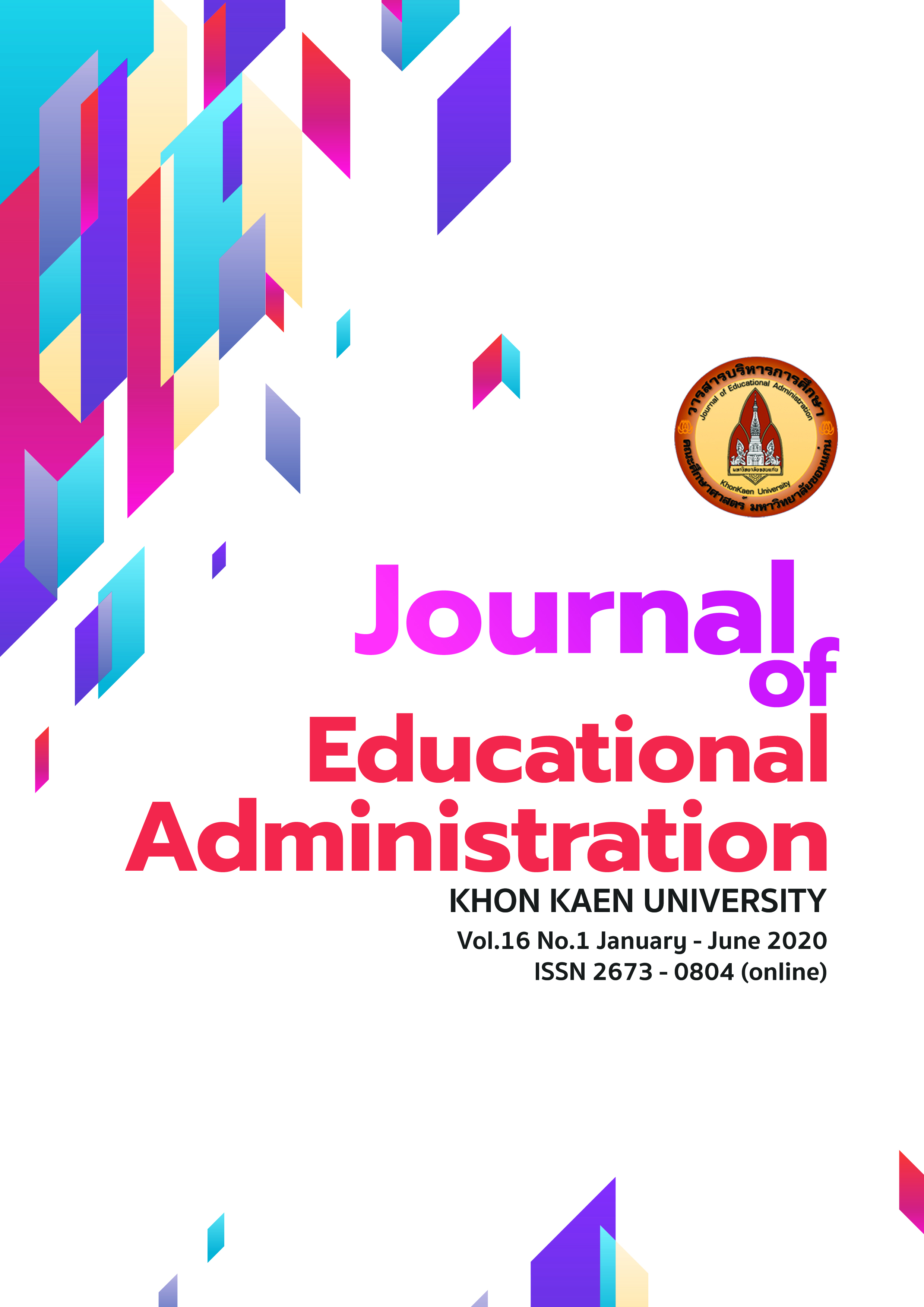NEEDS ASSESSMENT OF PRIVATE SCHOOL ACADEMIC MANAGEMENT BASED ON DIGITAL INTELLIGENCE CONCEPT OF PRIMARY SCHOOL STUDENTS
Main Article Content
Abstract
The purpose of this study was to study the needs assessment of private school academic management based on digital intelligence concept of primary school students. The sample of the selected schools was the group from the board of the private education commission in the primary school section from 345 different schools, which its selections performed by the multi-stage random sampling. Furthermore, the members of the population are the school director, chief academic officers, head of the department from the major subjects and teachers in a total of 1,725 people. The research tools are the questionnaires in the form of the Likert rating scales. As a result, 79.42% of the questionnaires returned from the sample group. The data were analyzed by frequency distribution, percentage, mean, standard deviations and PNI modified. Overall, the findings indicated that the highest priority need of private school academic management based on digital intelligence concept of primary school students is curriculum development, measurement and assessment, learning and classroom management, media, innovation, and educational technology, respectively. Lastly, as the overall average of individually averaged values has been considered, there is two identical value for the academic management, which are the digital safety, followed by the digital emotional intelligence and digital identity.
Article Details
References
กมล ภู่ประเสริฐ. (2544). การบริหารงานวิชาการในสถานศึกษา. กรุงเทพฯ: เมธีทิปส์.
กระทรวงเทคโนโลยีสารสนเทศและการสื่อสาร. (2559). แผนพัฒนาดิจิทัลเพื่อเศรษฐกิจและสังคม.
กรุงเทพมหานคร: กระทรวงเทคโนโลยีสารสนเทศและการสื่อสาร.
กระทรวงศึกษาธิการ. (2546). คู่มือการบริหารสถานศึกษาขั้นพื้นฐาน. กรุงเทพมหานคร: กระทรวงศึกษาธิการ.กระทรวงศึกษาธิการ. (2550). กฎกระทรวง กำหนดหลักเกณฑ์และวิธีการกระจายอำนาจทางการบริหารและ
การจัดการศึกษา. กรุงเทพฯ: กระทรวงศึกษาธิการ.
นภาวรรณ อาชาเพ็ชร. (2560). การรังแกผ่านโลกไซเบอร์ ความรุนแรงที่ต้องแก้ไข และนวัตกรรมการจัดการ
ปัญหา. วารสารวิชาการนวัตกรรมสื่อสารสังคม, 5(1), 100-106.
บุญรักษ์ ยอดเพชร. (2561). สพฐ.ลุยปรับหลักสูตรสถานศึกษารับ 4.0. ค้นเมื่อ 10 เมษายน 2563, จาก
https://www.thairath.co.th/news/local/1287037
ปรียาพร วงศ์อนุตรโรจน์. (2543). การบริหารงานวิชาการ. กรุงเทพฯ: บริษัท พิมพ์ดี จํากัด.
ภารดี อนันต์นาวี. (2557). หลักการ แนวคิด ทฤษฎี ทางการบริหารการศึกษา (พิมพ์ครั้งที่ 5). ชลบุรี:
สํานักพิมพ์มนตรี.
รุ่งชัชดาพร เวหะชาติ. (2550). การบริหารงานวิชาการสถานศึกษาขั้นพื้นฐาน. สงขลา: มหาวิทยาลัยทักษิณ.
สุวิมล ว่องวาณิช. (2558). การวิจัยประเมินความต้องการจำเป็น. กรุงเทพฯ: สำนักพิมพ์แห่งจุฬาลงกรณ์
มหาวิทยาลัย.
สํานักข่าว กรมประชาสัมพันธ์. (2561). รายงานพิเศษ : สํารวจพฤติกรรมออนไลน์ เด็กไทยเสี่ยงภัยออนไลน์.
ค้นเมื่อ 3 สิงหาคม 2562, จาก http://thainews.prd.go.th/th/website_th/news/news_detail/TNICT6103230010002
สำนักงานคณะกรรมการกิจการกระจายเสียง กิจการโทรทัศน์ และกิจการโทรคมนาคมแห่งชาติ. (2557). คู่มือ
แนวทางปฏิบัติการรักษาความปลอดภัยบนโลกไซเบอร์ภาคประชาชน. กรุงเทพฯ: บริษัท วี พริ้นท์ จำกัด.
สำนักงานพัฒนาธุรกรรมทางอิเล็กทรอนิกส์. (2562). วัยใส วัยเก๋า ฉลาดรู้เน็ต 2. กรุงเทพมหานคร: กระทรวง
ดิจิทัลเพื่อเศรษฐกิจและสังคม.
สํานักงานเลขาธิการสภาการศึกษา. (2561). มาตรฐานการศึกษาของชาติ พ.ศ.2561. กรุงเทพมหานคร:
กระทรวงศึกษาธิการ.
สำนักงานเลขาธิการสภาการศึกษา. (2563). สภาวะการศึกษาไทย 2561/2562 การปฏิรูปการศึกษาในยุค
ดิจิทัล. กรุงเทพฯ: บริษัท ภาพพิมพ์ จำกัด.
สํานักงานสภาความมั่นคงแห่งชาติ. (2560). ยุทธศาสตร์การรักษาความมั่นคงปลอดภัยไซเบอร์แห่งชาติ พ.ศ.
–2564. กรุงเทพมหานคร: สํานักพิมพ์คณะรัฐมนตรีและราชกิจจานุเบกษา.
อดิศักดิ์ ภาณุพงศ์. (2561). ซับซ้อน ซ่อนเงื่อน “สื่อลามกเด็ก” อาชญากรรมใต้ดิน ยุคไซเบอร์. ค้นเมื่อ 11
กรกฎาคม 2562, จาก https://www.matichon.co.th/lifestyle/news_1236480
อุทัย บุญประเสริฐ. (2540). หลักสูตรและการบริหารงานวิชาการโรงเรียน. กรุงเทพฯ: สามเจริญพานิช.
อุดม คชินทร. (2561). สช.เชื่ออีก 20 ปี เอกชนพลิกสถานการณ์การศึกษาไทย คาดแบ่งจัดการกับรัฐ 50:50.
ค้นเมื่อ 1 สิงหาคม 2562, จาก https://www.isranews.org/isranews-pr-news/63422-education.html
DQ Institute. (2018). 2018 National DQ Impact Report : Thailand. ค้นเมื่อ 11 กรกฎาคม 2562 จาก
https://www.dqinstitute.org/country-thailand/
European Commission. (2017). DigComp2.1 The Digital Competence Framework for Citizens.
European Union: Luxemberg Publications.
Park, Y. (2016). 8 digital skills we must teach our children. ค้นเมื่อ 22 กรกฎาคม 2562 จาก
https://www.weforum.org/agenda/2016/06/8-digital-skills-we-must-teach-our-children.
Yamane, T. (1973). Statistics: An Introductiry Analysis. New York: Harper and Row Publication.


